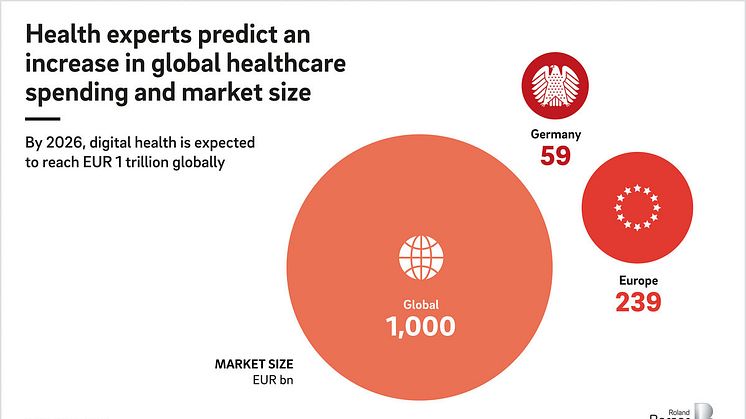
Press release -
Digital and physical innovations stimulate the healthcare sector
- Digital products and services will account for 12 percent of total healthcare spending by 2026
- Market is set to grow to EUR 59 billion in Germany and EUR 239 billion in Europe in the next five years
- Artificial intelligence, sensors for continuous monitoring, and cell and gene therapies hold the greatest potential
Munich, September 2021: Global efforts to overcome the Covid-19 pandemic ushered in an era of innovation in the medical sector. The vaccines built around the novel mRNA technology are a highly visible example of this, alongside a multitude of new use cases for digital services. The unmistakable trend is that physical technologies (mechanical, electrical, biological and chemical innovations) and digital services are combining to create new treatment possibilities. Such products and services are a part of a digital healthcare market that is set to grow to EUR 59 billion in Germany and EUR 239 billion in Europe by 2026. These are among the key findings of the Roland Berger study, "Future of health 3 – Innovation boosted". A total of 400 international experts from the pharmaceutical and medical devices industry were surveyed for the publication.
"We are seeing a growing convergence of physical and digital solutions in a number of areas," says Karsten Neumann, Partner at Roland Berger. "Revolutionary medical technologies such as mRNA vaccines or cell and gene therapy are opening up a whole new world of possibilities. Together with digital offerings, these hybrids are creating an entirely new class of therapies and have the potential to improve the lives of large numbers of patients."
In the survey, 78 percent of those polled said that digital technology will play a significant role in prevention, early detection, therapy selection and supervision or coaching, but not in therapy itself. More than 50 percent of respondents also believe that AI will have the greatest impact on transforming the healthcare market. The next biggest impact in the period to 2026 is expected to come from sensors in digital devices for continuous monitoring (49%), followed by cell and gene therapies (35%) and individual digital coaching models for patients with chronic diseases (35%). "For all of these innovations, it is not a question of if but when they will start being used in medical practice," says Oliver Rong, Partner at Roland Berger.
Impacts on the healthcare system
These developments will have different impacts on the players in the healthcare market and no one type of player is going to be offering everything under one roof. Tech firms will tend to become platform operators and the pharma industry will drive physical innovations. Health insurance companies may see a fundamental shift in their role, not only because innovations could lead to a further rise in healthcare costs but also because digital innovations give the people they insure more options at their disposal.
"People will take more responsibility for their own health in the future, and using digital tools is just one of the ways they will do this. As consumers, they are also prepared to spend money themselves. That is a trend that was already apparent before the pandemic and has certainly accelerated in the course of recent months," explains Rong. Further, the Roland Berger experts recommend that doctors and hospitals continue to drive the digitalization of their workflows and processes. "That will ultimately make treatment processes easier and more efficient for patients and healthcare staff alike," says Rong.
Future success will be determined by cooperation and innovation networks
Given the pace of change in the healthcare sector and the wide array of new possibilities digitalization opens up, healthcare players of all types should take a critical look at what their future role could be and draw up scenarios for how the market and costs will develop in the future. The ability to participate in open innovation networks will be a competitive advantage for everyone in the sector, as will a focus on platform thinking and collaborations. With this mindset, players will be able to drive forward with innovations faster and make them more cost efficient for the healthcare system. "Digitalization in healthcare creates entirely new opportunities for better care, but it also requires more forward planning and flexibility from all market participants," says Neumann.
Topics
Categories
Roland Berger is the only management consultancy of European heritage with a strong international footprint. As an independent firm, solely owned by our partners, we operate 50 offices in all major markets. Our 2400 employees offer a unique combination of an analytical approach and an empathic attitude. Driven by our values of entrepreneurship, excellence and empathy, we at Roland Berger are convinced that the world needs a new sustainable paradigm that takes the entire value cycle into account. Working in cross-competence teams across all relevant industries and business functions, we provide the best expertise to meet the profound challenges of today and tomorrow.




